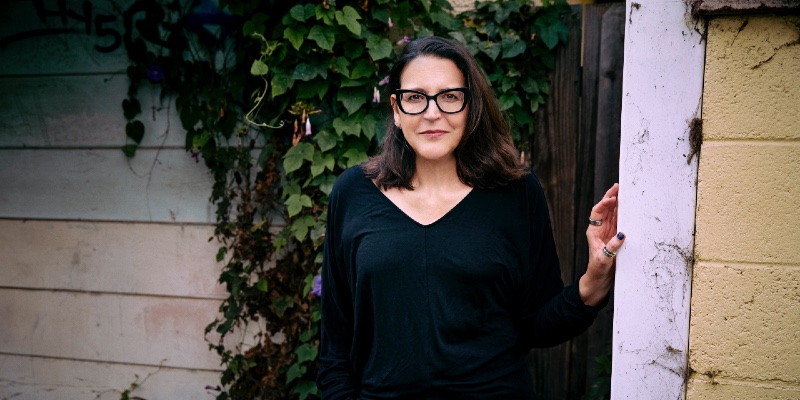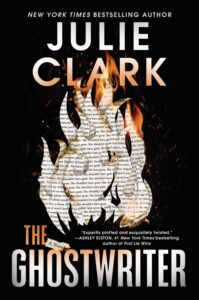The difference between failure and success can be as much a mystery as anything you’ll find in a book.
Julie Clark could have been a(nother) victim of the publishing industry’s seeming indifference when her first book (2018’s The Ones We Choose) underperformed, and she decided to persist without any promises of a better outcome. In 2020, as the COVID pandemic soared, her follow-up, The Last Flight, became an instant New York Times bestseller (thanks in large part to an eBook promotion) and earned the rare trifecta of starred reviews from Publishers Weekly, Library Journal, and Kirkus. Clark—also a teacher, the income from which affords her a level of creative liberty—hasn’t looked back, reaffirming her prowess with The Lies I Tell and The Ghostwriter (Sourcebooks Landmark; June 3, 2025).
The book’s central character, Olivia Dumont, is as plucky as Clark herself. A once celebrated ghostwriter, Olivia’s star has fallen since she dared to publicly challenge a male colleague over his lack of integrity. On the brink of career and financial ruin as a result, she reluctantly accepts a job that just might change her fortunes for the better: finishing her estranged father’s latest manuscript. Expecting the book to be another of the horror novels on which Vincent Taylor has built his brand, Olivia is surprised (and intrigued) to discover that it’s actually a memoir chronicling the unsolved murders of his siblings, Poppy and Vincent, fifty years ago—a crime for which he has always remained under suspicion.
Drawn in by the prospect of learning the truth at long last, Olivia is dismayed to discover that her father’s writings are rambling and his recollections unreliable—the result, at least partially, of progressive Lewy Body Dementia, which has compromised his memories and communicative abilities. With both their personal and professional reputations on the line, Olivia is determined to unmask the killer(s)—even if it is her father—and restore the family legacy. But doing so will prove both heartrending and harrowing in ways she could never have imagined. Will the truth set her free or become yet another prison from which she can’t escape?
Here, Julie Clark discusses the real-life inspirations behind The Ghostwriter and her hard-won happy ending …
John B. Valeri: The Ghostwriter’s complex and highly conflicted protagonist, Olivia Dumont, finds herself at personal and professional crossroads (some aspects of which are unique to women in publishing). Tell us about the ways in which her past hovers over her present like a specter – and how the opportunity to pen her estranged father’s memoir presents an opportunity that is rife with the potential for preservation and peril.
Julie Clark: Olivia represents women inside and outside publication. For too long our voices are discounted or they’re punished when we speak a truth that makes men in power uncomfortable. To be honest, I’m being deliberately harsh, curious how many emails you (or I) will get when they read this answer. Olivia has to walk a fine line between protecting her reputation as a ghostwriter and honoring her aunt and uncle and the truth of what happened to them. Olivia has learned — early on and incorrectly — that hiding the truth will keep her safe, so I think her ultimate takeaway is how important it is to speak the truth to power. Even when it might cost you your career.
JBV: More than a (masterful!) murder mystery, the book is a study in intergenerational trauma. What was your methodology in mining Olivia’s and Vincent’s characters for emotional depth to show the ripple effects of tragedy? Also, how did you find an entry point into Vincent’s earlier life so that his siblings, Poppy and Danny, would come alive on the page rather than being relegated to past tense victim status?
JC: I’ve been fascinated by epigenetics since I researched it for my first book, The Ones We Choose, which released in 2018, a lifetime ago. Geneticists have proven that DNA can be altered by trauma, and that trauma can be passed down to future generations. It’s a sobering reality in the world we live in today, in a culture that prioritizes achievement and capitalism over self-care. The evolution of younger Vincent, Danny and Poppy was something that took a lot of time to develop. Trying to portray their relationships honestly and authentically took many, many rewrites! I’m proud of who each of them turned out to be.
JBV: Vincent is afflicted with Lewy Body Dementia, which affects his behavior, communication, and memory. How does his condition serve to underscore both the suspicion he has lived under since the murder of his siblings and the unreliability of his narration? What was your approach to rendering LBD with accuracy and sensitivity so that it wasn’t simply a plot device but a dynamic depiction of illness?
JC: Like many authors, I always try to think broadly and not rely on the issues we see a lot in books – substance abuse, Alzheimer’s, cancer etc. I also had a longtime friend whose father was diagnosed with LBD when I was just starting to write the book, and sadly passed away during the publication process. It hadn’t been something I had seen explored earlier, and felt like it deserved a moment of awareness. It’s truly a heartbreaking condition not just for the one who suffers from it, but for their family members as well. I tried to represent it as best I could based on the first-hand accounts I had, though the truly horrific part of LBD is that there is no predictable progression. Everyone is different, so there aren’t any signposts along the way.
JBV: The book’s central crime is based loosely on a real event that happened in the city where you grew up. Without delving into specifics, tell us how the basic facts of that case – and perhaps more importantly, the feelings – influenced what occurs on the page. How do you endeavor to balance entertainment with the realities of violent crime in your stories?
JC: I thought long and hard about whether I even wanted to talk about the events that occurred in the 70’s in my hometown, mostly because they are 99% different from what’s portrayed in The Ghostwriter. I also want to respect the grief and trauma that still resonates in our community to this day. Friends and family still mourn and remember their friends and loved ones. I think the main takeaway – and I hope, if any of those folks end up reading the book will appreciate – is the fact that we can lose someone at a very young age and it never stops hurting. It’s a pain that reverberates decades beyond the event itself.
JBV: Much of the story is set against the backdrop of Ojai, California. In what ways do you find that place enhances plot? Also, how do you weigh accuracy with creative license when using an actual locale?
JC: I chose Ojai because the environment in the 70’s would best match what I was hoping to portray – the freedom of being a teenager in the 70’s. Ojai was much more rural and less of a designer hotspot in the 70’s than it is now, and it was a place where the kids had a huge amount of leeway – to hitchhike, to wander, to camp alone – and I felt that lent itself to the story I wanted to tell. It’s very challenging to portray a real place accurately, and I worked with a local historian who lived in Ojai in the 70’s who remembered it well and was so patient with all my emails. I tried to stay true to the topography as much as possible, with the exception of the actual houses that are on the west side of Ojai that are now adjacent to the Ojai Valley Preserve. When you set a book in a real location, it’s easy to fall into a rabbit hole of trying to get everything 100% accurate, but then you get bogged down in the details of the place and pull the reader out. I hope I was able to do 1975 Ojai justice, and despite what happens in the book, portray it as a wonderful place to grow up, because it was.
JBV: You are a testament to the fact that writing doesn’t have to be a person’s first (or only) career. What sustained you in the years between knowing you wanted to write and actually doing it? In retrospect, how do you think that time, perspective, and touchstone moments have ultimately benefited your craft?
JC: I really wanted to write short pieces like Anna Quindlen used to write back in the 1980’s and 90’s, but I learned pretty quickly that no one was interested in the reflections of a 20-something young adult who hadn’t experienced anything of substance yet. So I ended up teaching and have been doing that for the past 27 years. The best part about having a second job is that I have the luxury to write what I want to write without worrying about whether I can sell it or not. I have time between books to dig into ideas that excite me rather than what will pay the bills. But beyond that, I also grew up. I got married, became a mother, got divorced, raised two boys on my own, got diagnosed and treated for cancer….life happens and all of it teaches us how to reflect and grow as a human. Which I think adds a nuance to my work that could never have been present 30 years ago.
JBV: Some people may not know that you published a book before The Last Flight. What lessons did you learn from that book’s reception – and how did those lessons influence your involvement in support of The Last Flight, which achieved significantly greater visibility and sales? What advice would you give to other writers who may be struggling to determine just where to concentrate their time, energy, and money in terms of marketing/promotion?
JC: That was a really tough time! I almost wasn’t able to sell The Last Flight because the sales of my first book, The Ones We Choose, were so bad. So I pushed my former publisher to drop the e-book price, spent money I didn’t have to do a BookBub promotion and learned everything I could about ad stacking. Many people weren’t sure if it would work, but it did and I was able to get The Last Flight published with Sourcebooks and I’ve never looked back! I think what it taught me is that you can fail, but if you don’t give up, you will get another chance. Too often writers whose books don’t sell well are told that they’re pretty much done, but that’s not always true. I also have been lucky to have the best partner and agent, Mollie Glick, in my corner and that has always given me the confidence to swing big. She is always fond of telling me, “You just write it and let me worry about selling it” and she hasn’t been wrong yet.
JBV: Leave us with a teaser: What comes next?
JC: I can’t say much yet because it’s still early days, but I’m hoping it’ll be a speculative thriller. Stay tuned!


















